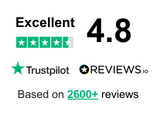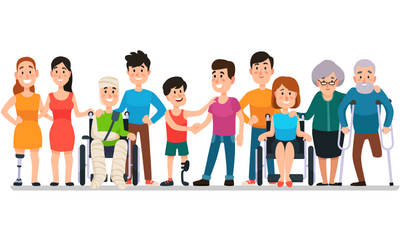GET THIS COURSE AND 1500+ OTHERS FOR ONLY £49 FIND OUT MORE
Imagine having the knowledge, skills, and confidence to support individuals facing mental health challenges, dementia, and learning disabilities. Whether you’re a healthcare professional, educator, caregiver, or simply someone eager to make a positive impact, this course is your gateway to a fulfilling and rewarding journey!
Approximately 1 in 4 adults in the UK experiences a mental health problem in any given year. Depression, anxiety, and bipolar disorder are among the most common mental health conditions. And there are estimated to be around 850,000 people living with dementia in the UK. Alzheimer’s disease being the most common type.
And as for Learning Disability, it is estimated that there are around 1.5 million people in the UK with a learning disability.
Moreover, this course will teach you how to support people with learning disabilities, dementia, and mental health issues. You’ll also learn how to handle mental health crises and give the best care to people with dementia and learning difficulties. The simple lessons will help you gain the knowledge you need to make a real difference.
Once you finish the course, you’ll feel confident in supporting people in their daily lives. Not only will you know how to help those with dementia, mental health conditions, and learning disabilities, but you’ll also be well-equipped to make a meaningful impact. Start now to grow your career and improve lives.”
Don’t just be a spectator in the global movement toward better mental health care—become an active participant. The skills you learn here will empower you to help individuals live fuller, more dignified lives, regardless of their challenges.
- Extra Included :
- Free Accredited Certificate Included
- Unlimited Free Retake Exams
- Free Course Included : Mental Health Safeguarding Level 3 Course
- Free Course Included : Basic Life Support and First Aid Training Course
Key Features
- Accredited by CPD
- Instant e-certificate and hard copy dispatch by next working day
- Fully online, interactive course with audio voiceover
- Developed by qualified professionals in the field
- 2 Free Courses Included
- Instant Access
- Self-paced learning and laptop, tablet, smartphone-friendly
- 24/7 Learning Assistance
The average salary for this skill is £23,925 per year, which is about £12.32 per hour. with the potential to earn up to £30,088 annually, according to leading UK career websites.
“Changing social attitudes towards mental illness is crucial for reducing stigma and improving treatment outcomes.”
Dr. Michael Johnson, Social Psychologist, University of California (2019)
Learning Outcomes Learning Disabilities Support Worker Course
By the end of this online Mental Health, Dementia and Learning Disabilities, learners will get the following benefits
- Understand the emotional impact of mental health conditions on individuals and their behaviour.
- Learn how mental health, dementia, and learning disabilities influence daily life and care needs.
- Develop positive attitudes and approaches towards supporting individuals with mental health conditions.
- Identify necessary adjustments in care delivery to meet the needs of individuals effectively.
- Recognise the importance of early detection and intervention for mental health and related conditions.
- Gain knowledge of relevant legislation, policies, and their requirements in care settings.
- Evaluate the impact of legislation and policies on the care and support provided.
- Understand the concept of capacity and its implications in delivering person-centred care.
Who Should Take The Learning Disabilities Support Worker Course?
This course is perfect for anyone who wants to become a learning disability support worker. It teaches you how to help people with learning disabilities, mental health problems, and dementia. Therefore, if you’re looking to work as a support worker, this course is the right choice for you.
Additionally, it is ideal for people already working in care who are looking to improves their skills. The course covers how to assist individuals with learning difficulties and mental health challenges. As a result, you will learn how to improve their lives and well-being.
Moreover, taking this course will help you build a solid career in health and social care. You’ll gain the essential knowledge required to support people with diverse needs.
Course Duration and Format
The course lasts for 14 hours and 44 minutes. It is online, so you can learn at your own pace. Therefore, you can study whenever and wherever you want.
Moreover, the course is divided into simple modules. Each module covers key topics, such as the role of a support worker in learning disabilities and dementia care. You can stop and start the course as you need, which adds to its flexibility.
This makes the course easy to fit into your busy life. Whether you are new to being a learning disability support worker or want to improve your skills, this course is perfect for you.
Career Path of Mental Health, Dementia and Learning Disabilities Support worker
- Learning Disability Support Worker Average salary: £18,000 - £24,000 per year
- Dementia Care Worker Average salary: £19,000 - £25,000 per year
- Mental Health Support Worker Average salary: £18,500 - £26,000 per year
These jobs give you a chance to grow in health and social care. With more experience and qualifications, you can earn a higher salary.
Certification of Mental Health, Dementia and Learning Disabilities Support worker
Once you’ve successfully completed your course, you will immediately be sent a digital certificate. Also, you can have your printed certificate delivered by post (shipping cost £3.99). All of our courses are fully accredited, providing you with up-to-date skills and knowledge and helping you to become more competent and effective in your chosen field. Our certifications have no expiry dates, although we do recommend that you renew them every 12 months.

Accreditation of Learning Disability Support Worker
All of our courses, including this Mental Health, Dementia and Learning Disabilities, are fully accredited, providing you with up-to-date skills and knowledge and helping you to become more competent and effective in your chosen field.
“Eating and sleeping disorders are often interconnected with other mental health conditions. Comprehensive treatment plans are essential.”
Dr. Jane Smith, Mental Health Specialist, University of Oxford (2020)
Course Curriculum
The detailed curriculum outline of our Mental Health, Dementia and Learning Disabilities is as follows:
Module 01: How Someone May Feel if They Have Mental Health Conditions
Explores the emotional and psychological impact of mental health conditions, fostering empathy and understanding.
Module 02: How Conditions Influence a Person
Examines how mental health conditions affect daily life, relationships, and overall well-being.
Module 03: How Positive Attitudes Towards Those With Mental Health Conditions
Highlights the importance of reducing stigma and promoting supportive, inclusive attitudes.
Module 04: Adjustments which may be Necessary in Care Delivery
Covers practical adaptations in care to meet the unique needs of individuals with mental health conditions.
Module 05: Importance of Early Detection of Mental Health Needs
Discusses the benefits of early intervention in improving mental health outcomes and quality of life.
Module 06: Requirements of Legislation and Policies
Introduces key laws and policies shaping mental health care and service provision.
Module 07: Effect of Listed Legislation and Policies
Analyses the impact of mental health legislation on care standards and patient rights.
Module 08: Capacity
Explores decision-making capacity, legal frameworks, and ethical considerations in mental health care.
Module 09: Overview of Mental health First Aid.
Provides an introduction to recognising and responding to mental health crises effectively.
Module 10: Childhood and Adolescent Psychiatric.
Examines common mental health conditions affecting children and young people.
Module 11: Stress and Anxiety Disorders.
Explores causes, symptoms, and treatment approaches for stress and anxiety-related conditions.
Module 12: Self Harm and Suicide.
Discusses risk factors, prevention strategies, and support for individuals at risk.
Module 13: Medication and Therapy in the treatment of Mental Illness.
Covers pharmacological and therapeutic approaches to managing mental health conditions.
Module 14: Mental Health in the Workplace.
Addresses workplace mental health challenges and strategies for creating a supportive environment.
Module 15: Approach and React to People in Mental Health Crisis.
Provides guidance on de-escalation techniques and appropriate responses during a crisis.
Module 16: Defining Dementia
Introduces dementia, its symptoms, and its impact on individuals and families.
Module 17: The Brain and How Dementia Affects It
Explains the neurological changes caused by dementia and their effects on cognition and behaviour.
Module 18: Types of Dementia
Explores different forms of dementia, including Alzheimer’s, vascular dementia, and others.
Module 19: Stages of Dementia
Outlines the progression of dementia from early to advanced stages.
Module 20: Assessing Dementia
Covers diagnostic tools, assessments, and early signs of dementia.
Module 21: Pharmaceutical Treatment for Dementia
Examines medications used to manage symptoms and slow progression.
Module 22: Psychological Treatment for Dementia
Explores therapy and non-medical interventions for improving quality of life.
Module 23: Raising Awareness and Preventing Dementia
Discusses risk factors, prevention strategies, and public awareness initiatives.
Module 24: Caregiving for Dementia
Provides insights into best practices for supporting individuals with dementia.
Module 25: Dementia Care: Acts and Legislation
Reviews key laws and policies governing dementia care and patient rights.
Module 26: Learning Disability and Mental Health.
Explores the intersection between learning disabilities and mental health conditions.
Module 27: Future Spheres of Practice for Learning Disability Nursing.
Examines emerging trends and evolving roles in learning disability nursing.
Module 28: Psychosocial Interventions.
Covers therapeutic approaches focusing on social and psychological support.
Module 29: Psychodynamic Approaches.
Explores the role of unconscious processes and past experiences in mental health.
Module 30: Learning Disability Nursing Throughout the Lifespan.
Discusses the role of learning disability nurses in supporting individuals at different life stages.
Module 31: Role of the Learning Disability Nurse in Promoting Health and Well-Being.
Highlights the nurse’s role in advocating for and supporting the overall well-being of individuals with learning disabilities.
Module 32: Care Planning in Mental Health Settings.
Covers personalised care planning and multi-disciplinary approaches in mental health care.
Module 33: Nursing Models and Behavioural Interventions.
Introduces frameworks and techniques for supporting behavioural and emotional well-being.
Module 34: The Future of Learning Disability Nursing.
Explores the evolving landscape of learning disability nursing and its future developments.
Module 35: Future Spheres of Practice for Learning Disability Nursing.
Looks at expanding roles, specialisations, and innovations in learning disability nursing.
Learning Disability Support Worker Course Reviews

FAQs About Learning Disability Support Worker
What is Learning Disability Week 2024?
Learning Disability Week 2024 is an annual event dedicated to raising awareness about learning disabilities and promoting inclusivity. It highlights the challenges faced by individuals with learning disabilities and celebrates their achievements. The week aims to encourage better understanding and support for people with learning disabilities, while advocating for equal opportunities and rights in society.
Do I need a qualification to take the Level 3 Paediatric First Aid course?
No prior qualification is needed to take the Learning Disability Support Worker course. This course is designed for anyone interested in starting a career in supporting individuals with learning disabilities, regardless of their educational background. Whether you’re new to the field or looking to enhance your skills, this course is a great starting point!
What is a learning disability support worker?
A learning disability support worker assists individuals with learning disabilities in daily activities, helping them live more independently. They provide support in areas such as personal care, social interaction, and skill development. Their role involves creating a positive, supportive environment to help individuals overcome challenges and achieve their goals.
What are the common disability signs to look out for in children and adults?
Disability signs can manifest differently in both children and adults, and recognizing them early can lead to better support and care. In children, common disability signs include developmental delays, learning difficulties, behavioral challenges, and physical limitations, such as struggling with basic motor skills. In adults, mobility issues, cognitive challenges like memory loss, emotional changes, and speech difficulties may indicate underlying disabilities. Whether it’s a child or an adult, noticing these disability signs and seeking medical advice for a thorough assessment can help ensure early intervention and appropriate support.
Can disability signs be different in children and adults?
Yes, disability signs can vary between children and adults. In children, signs of disability may be more developmental and behavioral, such as delays in speech, motor skills, or social interaction. In adults, disabilities may present through more established patterns of behavior or physical limitations, which can sometimes be linked to longer-term health conditions. Recognizing the signs at different stages of life is important for early intervention and appropriate care.
What is the connection between dementia and learning difficulties?
Dementia and learning difficulties can sometimes overlap, especially in individuals who may have had learning difficulties throughout their life and develop dementia later on. Both conditions affect cognitive abilities, but dementia typically involves a decline in mental functions like memory, thinking, and reasoning, while learning difficulties primarily affect the ability to acquire new skills or knowledge.
Can dementia and learning difficulties worsen over time?
Yes, both dementia and learning difficulties can worsen over time, especially if they occur together. As dementia progresses, it may accelerate the challenges that come with learning difficulties, making it more difficult for individuals to process information or manage day-to-day tasks.
What jobs can I get with this skill and knowledge?
With the skills from this course, you can pursue roles like Mental Health Support Worker, Learning Disability Support Worker, Care Assistant, Residential Support Worker, and Outreach Worker. These positions are available in healthcare settings, care homes, hospitals, and supported living environments.
What is the average salary for a Care Assistant in the UK?
The salary for a support worker specializing in mental health, dementia, or learning disabilities can vary depending on factors such as experience, location, and the specific role. On average, in the UK, you can expect to earn between £18,000 and £25,000 per year. However, for those with more experience or in senior positions, the salary can increase to over £30,000 annually. Furthermore, it’s important to note that salaries may be higher in areas with a higher cost of living or for more specialized roles within these fields. Therefore, your earnings will depend on a combination of these key factors.
Can international students enrol in the Level 3 Paediatric First Aid training course?
Yes! Our Mental Health, Dementia, & Learning Disability course is available to international students. Since it’s an online course, you can study from anywhere in the world at your own pace. Once you complete the training and pass the assessment, you’ll receive a recognised certification that can help boost your skills and career opportunities in childcare and healthcare sectors globally!
How often is the course content updated?
To ensure compliance with the latest health and social care regulations and best practices, course content is reviewed and updated periodically.
Will I receive a certificate after completing this course?
Yes, you will receive a FREE Digital Certificate after completing this Mental Health, Dementia, and Learning Disability course online.
However, if you want, you can also order the Digital Transcript, Hardcopy Certificate & Transcript.
Ordering page link: https://www.trainingexpress.org.uk/certificate/
How do I purchase this course?
1. Click on ‘Take This Course’ button, and you will be directed to your Cart.
2. You can update the course quantity and remove any unwanted items in the Cart, and after that, click on the ‘Checkout’ option and enter your billing details.
3. Once the payment is made, you will receive an email with the login credentials, and you can start learning after logging into the portal.
You can take this course or find any course from the Courses section of our website.

SAVE 84% - OFFER ENDS SOON
£125.00Original price was: £125.00.£20.00Current price is: £20.00. ex Vat- 1 year
- Intermediate
- Course Certificate
- 14 hours, 44 minutes Gift this course
Subscribe to this course and 2,000+ top‑rated Training Express courses for your organization.
Try Training Express Business- For teams of 5 or more users
- 2,000+ fresh & in-demand courses
- Learning Engagement tools
- SSO and LMS Integrations
 Food Hygiene
Food Hygiene Health & Safety
Health & Safety Safeguarding
Safeguarding First Aid
First Aid Business Skills
Business Skills Personal Development
Personal Development






